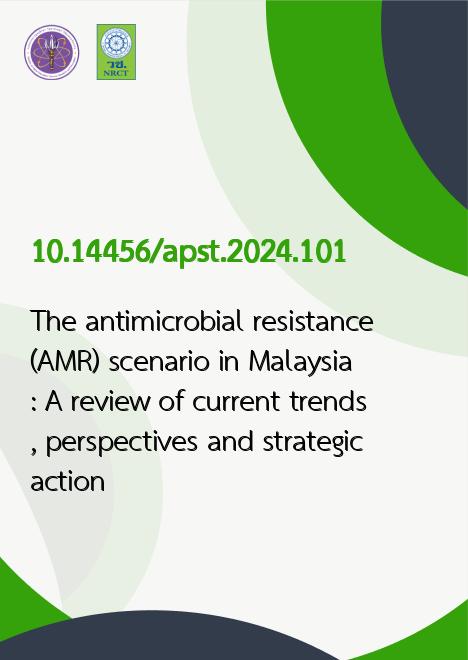
|
The antimicrobial resistance (AMR) scenario in Malaysia: A review of current trends, perspectives and strategic action |
|---|---|
| รหัสดีโอไอ | |
| Creator | Nur Azzalia Kamaruzaman |
| Title | The antimicrobial resistance (AMR) scenario in Malaysia: A review of current trends, perspectives and strategic action |
| Contributor | Deebadarishani Sathasivan, Mazlin Mohideen, Mohd Hafiidz Jaafar, Ana Masara Ahmad Mokhtar |
| Publisher | Asia-Pacific Journal of Science and Technology |
| Publication Year | 2567 |
| Journal Title | Asia-Pacific Journal of Science and Technology |
| Journal Vol. | 29 |
| Journal No. | 6 |
| Page no. | 16 (12 pages) |
| Keyword | Antimicrobial resistance (AMR), Antibiotics, Antimicrobial stewardship program (ASP), Healthcare professionals, Public awareness, Agriculture, Aquaculture, Non-governmental organisation (NGO) |
| URL Website | https://so01.tci-thaijo.org/index.php/APST/ |
| Website title | https://so01.tci-thaijo.org/index.php/APST/article/view/277993 |
| ISSN | 2539-6293 |
| Abstract | Fast becoming a global health crisis, antimicrobial resistance (AMR) is causing numerous deaths and having economic implications worldwide. This review paper highlights the AMR scenario in Malaysia, primarily in regard to the clinical implications of common bacterial pathogens. Other highlights of the study include the perspectives of public and private healthcare professionals, as well as consumers, on the knowledge, attitudes, and practices (KAP) associated with AMR and antibiotics usage, the aim being to identify gaps in the way AMR is addressed in Malaysia. In addition to the human factor, the agriculture and aquaculture sectors also contribute to AMR. The crucial role of the antimicrobial stewardship program (ASP) in Malaysia is also discussed here, with its implementation outlined chronologically. Furthermore, Malaysia’s AMR strategic action is assessed against the policies of other Southeast Asian countries to obtain a more comprehensive understanding of various international efforts to mitigate AMR issues. Alongside government measures, many non-governmental organisations (NGOs) are also actively involved in various AMR initiatives through international workshops and meetings, the creation of task forces, and heightening AMR awareness through publications, social media, and toolkit development. These efforts and more are necessary to raise awareness of AMR and address the related issues effectively. |